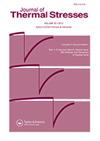Numerical study of the thermal behavior of a cylindrical fin formed by two orthotropic media
IF 2.6
3区 工程技术
Q2 MECHANICS
引用次数: 0
Abstract
Abstract Numerical solutions are constructed and presented for the thermal distribution, the dimensionless heat flux rate, and fin efficiency for a two-dimensional orthotropic fin of cylindrical geometry formed by two media subject to a convection limit condition on the side surface and at the high fin base, and to a uniform temperature imposed on the other base of the fin. The results are presented and discussed according to the study parameters, radial thermal conductivity ratio, radial Biot number, and axial Biot number for each medium. Many specific cases are obtained from the global solution presented in this work, among others, the temperature distribution and the dimensionless heat flux rate at the base of a single orthotropic or isotropic fin as well as the case of a fin formed by an orthotropic and isotropic media. The findings of the present study demonstrate that the newly proposed fin design significantly improves the dimensionless heat flux rate of the fin compared to the conventional design. This improvement is particularly significant when the axial Biot number of the outer medium is high and the axial Biot number of the inner medium is low, regardless of the ratio of radial thermal conductivities. These results suggest that the proposed fin design is better suited for applications where heat transfer is critical, and the external environment has a high thermal resistance. In addition, the proposed design also provides a more compact geometry, which not only improves the mechanical performance of the fin but also reduces the cost of the material used in its fabrication.两种正交各向异性介质圆柱翅片热特性的数值研究
摘要构造并给出了由两种介质形成的圆柱形二维正交各向异性翅片的热分布、无量纲热通量率和翅片效率的数值解,该翅片在侧面和高翅片底部受到对流极限条件的影响,并在翅片的另一个基部受到均匀温度的影响。根据研究参数、每种介质的径向热导率、径向Biot数和轴向Biot数,给出并讨论了结果。从本文给出的全局解中获得了许多具体情况,其中包括单个正交各向异性或各向同性翅片底部的温度分布和无量纲热通量率,以及由正交各向异性介质形成的翅片的情况。本研究的结果表明,与传统设计相比,新提出的翅片设计显著提高了翅片的无量纲热通量率。当外部介质的轴向Biot数较高而内部介质的轴向Biot数较低时,这种改进尤其显著,而与径向热导率的比值无关。这些结果表明,所提出的翅片设计更适合于传热至关重要、外部环境具有高热阻的应用。此外,所提出的设计还提供了更紧凑的几何形状,这不仅提高了翅片的机械性能,还降低了制造中使用的材料的成本。
本文章由计算机程序翻译,如有差异,请以英文原文为准。
求助全文
约1分钟内获得全文
求助全文
来源期刊

Journal of Thermal Stresses
工程技术-力学
CiteScore
5.20
自引率
7.10%
发文量
58
审稿时长
3 months
期刊介绍:
The first international journal devoted exclusively to the subject, Journal of Thermal Stresses publishes refereed articles on the theoretical and industrial applications of thermal stresses. Intended as a forum for those engaged in analytic as well as experimental research, this monthly journal includes papers on mathematical and practical applications. Emphasis is placed on new developments in thermoelasticity, thermoplasticity, and theory and applications of thermal stresses. Papers on experimental methods and on numerical methods, including finite element methods, are also published.
 求助内容:
求助内容: 应助结果提醒方式:
应助结果提醒方式:


